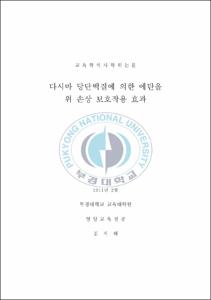다시마 당단백질에 의한 에탄올 위 손상 보호작용 효과
- Alternative Title
- protective effect of a glucoprotein from Laminaria japonica against ethanol-induced gastric injury in rats
- Abstract
- Abstract
As people's eating habit has been variously changing due to continuous economic growth and income increase, various chronic degenerative diseases, such as aging, cerebrovascular diseases, heart diseases, high blood pressure or diabetes, has been increased, as well as the increase of mortality. Peptic ulcer causes epigastric pain, chest pain, hyperchylia, gastro-intestinal bleeding, spasm, and pressure, sometimes with nausea, vomiting, anorexia and weight loss (Ruth, 1998).
The medications to treat gastric perforation or gastric bleeding caused by gastric ulcer has been developed to treat pain and ulcerss and to avoid relapse (Higham et al., 2000), however, those medications are generally expensive and have various side effects. Therefore, there has been researches to examine materials that have pharmacological effects without any side effects by dividing bioactive substances from natural substances.
Laminaria japonica is very rich in major minerals that are involved in physiological metabolism of body such as calcium, kalium, iodine, and zinc (Ayako et al., 1992), as well as dietary fibers such as alginic acid which consists of uronic acid, laminaran (Lee et al., 1998) and fucoidan (Hwang et al., 1996) that contains sulfate group.
There has been reported that Capsosiphon fulvescens, Haematococcus and Sagassum fulvellum showed effects of damage inhibition by ethanol (Hwang et al, 2008; Raghavendran et al, 2004; Kamath et al, 2008), however there has not been any research on effects of Laminaria japonica. Thus, this experiment has examined the effect of glycoprotein, among the components of Laminaria japonica, on gastric damage in vivo experiments.
After one week acclimation to the basal diet, S.D. white rats were divided into 3 categories-control group, ethanol injecting group, injecting ethanol and LGP group and the results of the short-term experiments are as below.
According to gross morphology of inside surface of stomach, ethanol injection caused gastric bleeding, however, it inhibited bleeding just like in the control group when LGP was also injected.
Caspase-3 activity was increased when ethanol was injected (144±22.6) compared to control group (100%), and it is decreased to 89.8±34.4% when 150 mg/kg B.W. was injected and to 87.6±10% when 300 mg/kg B.W. was injected. Caspase-8 activity was increased when injecting ethanol (176.4±29.3) compared to the control group (100%), and it is decreased to 128±40.1% when injecting 150 mg/kg B.W. and to 110.7±31.8% when injecting 300 mg/kg B.W. The level of proteins of Procaspase-3 is degraded and decreased in the group injected with ethanol and increased while treated by LGP, and the level of proteins of cleaved PARP is increased in the group injected with ethanol and decreased while treated by LGP. GSH is more increased when treating ethanol solely (77.2±8.60%) compared to GSH in gastric tissues of the control group, however, it is increased again in the group that LGP was also injected (150 mg/kg, 100.6±2.70%. 300 mg/kg, 104.0±7.81%). In MAPK (Mitogen-activated protein kinases) signal transmission, ERK 1/2 was increased when treating ethanol and increased when injecting with LGP (150 mg/kg B.W.), on the other hand, JNK increased phosphorylation when treating ethanol and decreased when injecting ethanol with LGP, and p38 MAPK showed same trend with ERK.
The results suggest that alcohol-induced gastric damage in S.D. rats caused by oxidative damage due to ethanol is protected by treating LGP and that there is a possibility that LPG is useful for inhibiting alcohol-induced gastric damage as a functional new material.
- Issued Date
- 2011
- Awarded Date
- 2011. 2
- Type
- Dissertation
- Keyword
- Laminaria japonica glycoprotein ethanol
- Publisher
- 부경대학교
- Affiliation
- 부경대학교 교육대학원
- Department
- 교육대학원 영양교육전공
- Advisor
- 남택정
- Table Of Contents
- Ⅰ. 서론 1
Ⅱ. 재료 및 방법 4
1. 재료 4
가. 시약 및 재료 4
2. 실험방법 5
가. 시료의 조제 5
(1) 다시마로부터 당단백질 추출 5
(2) SDS-PAGE electrophoresis 7
나. 동물사육 7
(1) 위 조직중의 GSH 활성 측정 8
(2) 위 조직중의 caspase-3, -8 활성 측정 8
(3) 위 조직 Western blot 8
다. 통계처리 9
Ⅲ. 결과 및 고찰 10
1. 다시마로부터 당단백질 추출 및 정제 10
2. 에탄올에 의한 S. D. rat의 위 손상 및 LGP의 Ethanol 위 손상 억제 효과 12
가. 에탄올 및 LGP 투여가 위 무게에 미치는 영향 14
나. 에탄올 및 LGP 투여가 위 표면손상에 미치는 영향 16
다. 위 조직 중의 caspase-3, -8 활성에 미치는 영향 18
라. 위 조직 중의 procaspase-3, PARP 단백질 수준에 미치는 영향 20
마. 에탄올 및 LGP 투여가 위 조직 중의 산화적 스트레스에 미치는 영향 22
Ⅳ. 요약 및 결론 26
Ⅴ. 참고문헌 29
- Degree
- Master
- Files in This Item:
-
-
Download
 다시마 당단백질에 의한 에탄올 위 손상 보호작용 효과.pdf
기타 데이터 / 752.97 kB / Adobe PDF
다시마 당단백질에 의한 에탄올 위 손상 보호작용 효과.pdf
기타 데이터 / 752.97 kB / Adobe PDF
-
Items in Repository are protected by copyright, with all rights reserved, unless otherwise indicated.